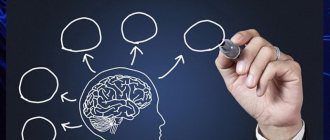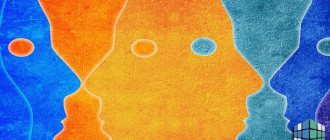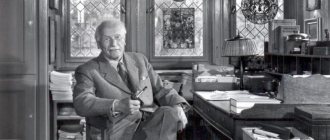Wilhelm Wundt
(1832 - 1920) - an outstanding German psychologist and physiologist, who actually became the founder of psychology as such. Wundt introduced into science an objective study of mental phenomena by analogy with other natural sciences, and showed the physiological relationship between the psyche and the brain; However, Wundt combined an objective approach to psychology with introspection, a method that was later recognized as unscientific.
Brief biography of the scientist
Wilhelm Wundt was born in 1832 into the family of a pastor. He graduated from the local school in 1851. He continued his studies at the University of Tübingen.
After receiving his diploma, he studied for a very short time with the famous German biologist Johann Muller. In 1858, he became an assistant to Hermann von Helmholtz and began giving lectures, during which he never tired of talking about the importance of using experimental methods in the study of psychology. His lectures were later compiled and published as a book, Lectures on the Mind of Man and Animals. Wundt began research that later resulted in the main work of his life, “Principles of Physiological Psychology.” In it, he described a method of studying psychology that was popular at that time - the method of introspection, thus becoming one of its founders. In 1875, Wilhelm Maximilian took up the position of professor of philosophy at the University of Leipzig. After 4 years of work, he decided to leave and founded the first psychological laboratory. (It’s interesting that one of Wundt’s students was our compatriot Ivan Pavlov.)
Wundt left behind an enormous scientific legacy - more than 50 thousand pages of articles and books.
Connection between brain and mind
Beginning in 1867, Wilhelm Wundt gave the first and only course of lectures on physiological psychology in the world at that time at the University of Heidelberg. In his course, he emphasizes the connection between the brain and the mind. Wund's knowledge and experience in physiology were of great importance for the formation of a new science - psychology. Wundt viewed it as a science that helps to understand the inner life of a person and, based on this knowledge, manage it. Tasks of psychology:
- identify the original elements through analysis;
- establish the nature of the connection between them;
- find the laws of this connection.
The lectures went down in history in the form of one of his most significant books, “Fundamentals of Physiological Psychology” (1873, 1874), which was reprinted six times.
Contributions to the study of psychology
Wilhelm Wundt became one of the first preachers of experimental psychology. He made human consciousness - its contents, processes and states - the main subject of his study.
The contents of consciousness, according to Wundt, include fleeting sensations, images of objects, desires, memories, emotions, etc.
Processes are divided into two types:
- Involuntary. They happen on their own. For example, when you are traveling on a train, the sound of the wheels seems to form a certain rhythm on its own.
- Arbitrary. Directed by a person. That is, if you wish, you can change this rhythm.
Also, the German psychologist was the first to introduce the concept of the volume of consciousness (the number of impressions that it can hold in itself at the same time) and concluded that this volume is not limited if the content is constantly combined into larger and larger units.
Strange case
While studying in Heidelberg with Professor Gasse, Wilhelm Wundt worked as an assistant in the women's department of a local clinic, which was headed by the professor himself. Due to the lack of money, the student had to be on duty for days, he was so tired that it was difficult to wake him up to visit the sick.
One day a funny thing happened. At night, Wundt was awakened to examine a delirious patient with typhus. Wundt went to her in a half-asleep state. He performed all actions mechanically: he talked with the nurse, examined the patient, and made appointments. As a result, instead of a sedative, the young assistant gave the patient iodine (at the time it seemed to him that it was a sedative). Fortunately, the patient immediately spat it out. Wundt realized what had happened only when he returned to his room. The half-asleep state in which he acted gave him no rest. In the morning he told everything to the professor and only then calmed down a little. But this incident made a very deep impression on the young man. Remembering his feelings, Wundt came to the conclusion that his perception then differed from reality: the distances seemed greater, the words were heard as if from afar, but at the same time, he perceived everything correctly auditorily and visually.
Wundt compared his state to a faint state and described it as a mild degree of somnambulism. This incident prompted Wilhelm Wundt to give up his career as a doctor. The future scientist spent a semester in Berlin, where he studied under the guidance of I. P. Müller; in 1856, in Heidelberg, Wundt defended his doctoral dissertation.
Method of studying psychology
In his research, Wundt used the method of introspection (self-observation), which is rejected by modern psychology due to excessive subjectivity. What was the essence of the method? Wundt and his colleagues (specially trained in introspection) observed themselves in various situations and compiled a report in which they described how they felt and how they behaved when stimuli appeared. Here is a clear example of how the method was applied. The subject was given a large red apple. But he could not write in the report: “They gave me an apple. It was big and red." He needed to dig deeper: “First I felt the red color of the apple. Then I felt its roundness and size. Then a slight tickling sensation appeared in the tongue - apparently a trace of a taste sensation,” etc.
Since psychology was just in its infancy in those days, Wilhelm Maximilian decided to take chemistry, which had already been sufficiently studied and developed, as the basis of science. That is why his system is characterized by elementalism.
Lectures
Why did students love attending Wundt's lectures so much? Let's try to understand what their magic is. To do this, let’s turn to the memories of the great professor’s students, try to travel back more than a hundred years ago and find ourselves on the student bench in front of the author of immortal psychological works.
So... The door swings open and Wundt enters. He is dressed all in black, from his shoes to his tie. Thin and slightly stooped, narrow-shouldered, he seems much taller than his real height. The thick hair has thinned a little on the top of the head and is covered by curls raised from the sides.
Walking loudly, Wundt goes to a long table, probably for experiments. There is a small portable shelf for books on the table. The professor selects a suitable piece of chalk for a few seconds, then turns to the audience, leans on the shelf and begins the lecture.
He speaks quietly, but within a minute there is dead silence in the audience. Wundt's voice is not the most pleasant to listen to: his thick baritone sometimes turns into something similar to barking, but the fiery and expressiveness of his speech did not allow a single word to go unheard.
The lecture goes by in one breath. Wundt does not use any notes, his gaze only occasionally falls on his hands, which, by the way, do not lie still for a second: they either sort through the papers, then make some kind of wave-like movements, or help the audience understand the essence of the material, illustrating the professor’s speech.
Wundt finishes his lecture right on time. Also stooping and stomping loudly, he leaves the audience. Fascinating, isn't it?
Basic principles, pros and cons of the Wundt method
There are three basic principles of the Wundt method:
- Human consciousness is a collection of personal experiences that do not manifest themselves externally. Therefore, it must be studied through introspection.
- The psyche and consciousness (what is conscious) are one and the same.
- Consciousness is a certain number of elements interconnected associatively.
As for the advantages and disadvantages, the main advantage of the method was that a person, with the help of introspection, will better determine his feelings and characteristics than anyone else. And the main disadvantage of the method is bias, because a person can interpret observations to his advantage.
Childhood
Wilhelm Max Wundt was born on August 16, 1832 in Neckarau. He was the last, fourth child in the family. However, the first two children died in early childhood, and brother Ludwig studied and lived in Heidelberg, with his mother's sister. It turned out that Wilhelm got the role of the only child.
Wundt's father was a pastor, the family seemed friendly to many, but Wundt later recalled that he often felt lonely and sometimes received punishment from his father for disobedience.
Almost all of Wundt's relatives were well educated and glorified the family in some science. No one had such hopes for Wilhelm; he was considered frivolous and incapable of learning. This was also confirmed by the fact that the boy could not pass the 1st grade exams.
What did the psychologist study in the laboratory?
In the 20 years since the founding of the psychological laboratory, Wundt and his students conducted more than 100 experiments. Basically, they considered those problems that had already been posed by other scientists, but were not fully studied. The first series of experiments was devoted to studying the psychological aspects of hearing, vision, smell, sense of time and other senses. Close attention was also paid to experiments studying reaction times. Wundt found that the human reaction to a stimulus can be divided into 3 stages:
- Perception of the stimulus.
- Awareness of the stimulus.
- Manifestation of will.
After exposure to a stimulus, a person perceives it, analyzes it and finally reacts. The reaction represents the movement of the muscles, and Wundt wanted to find out its average value. However, he was unable to do this, because... it was difficult to distinguish between the stages of the reaction. Another object of study by the psychologist was what we now call the focus of attention. An example of focus is the perception of the page that you now see in front of you. While you are reading one paragraph, others are not so clearly visible. Wilhelm Maximilian, among other things, wanted to take up the study of child psychology, but did not conduct experiments, because children were unlikely to be able to accurately describe their internal state and sensations.
Professor of Psychology Wundt
In 1875, Wundt received a professorship at the University of Leipzig, where he would remain for the next 45 years. Wundt was the supervisor of 186 students who defended their doctoral dissertations in various scientific disciplines. Among them are such famous names as Edward Titchener, Ivan Pavlov, Stanley Hall, James Cattell. Subsequently, they will make a serious contribution to the development of psychology in the USA, Russia, Japan, and Italy.
In 1879, Wilhelm Wundt founded the world's first psychological laboratory and brought together scientists from all over the world under one roof. First of all, Wundt develops a set of rules for conducting experimental research:
- observers must correctly determine the moment when the experiment begins;
- observers should never lower their level of attention;
- the experiment should always be organized in such a way that it can be carried out several times;
- The experimental conditions must be suitable for changes and control of stimuli.
The subject of research was three main directions, at the intersection of which experimental psychology arose: the study of sensations and perceptions, psychophysics, and the study of reaction time. Later, two more themes were added to these themes: associations and feelings. Wundt classified the types of connections (associations) that were established in the process of studying reactions. In Wundt's laboratory, sensation thresholds and reaction times to various stimuli, including speech, were experimentally studied for the first time. The results obtained were presented by him in the main work “Fundamentals of Physiological Psychology” (1880-1881). This book became the first textbook in the new discipline of experimental psychology.
It is curious that the creator of experimental psychology was not a true laboratory worker himself. According to the testimony of his first American student J. Cattell, he did not spend more than 5-10 minutes a day in the laboratory. The method of teaching creativity in his laboratory was original. He came out to the group of students standing in front of him with a stack of sheets of paper on which experimental tasks were written, and distributed them regardless of the interests of the performers. Then he checked their reports and evaluated them himself, deciding on publication in the journal he published. More than 600 students gathered in the auditorium for each lecture.
Around Wilhelm Wundt a large international school is gradually emerging, the like of which the history of psychology does not know. Gradually, a community of researchers, workers in a new field of knowledge took shape, which had its own organizational structures - laboratories, departments, journals, societies, and, since 1899, international congresses.
Personal life
The personal life of the professor is almost unknown to anyone today. The biography of Wilhelm Wundt was of interest to everyone from the point of view of his contribution to science. This is how an extraordinary personality is lost behind the curtain of the profession.
Wilhelm Wundt was very modest, unpretentious in everyday life. Everything in his life was clearly ordered, as evidenced by the diaries of his wife, Sophie Mau:
- Morning - working on manuscripts, getting acquainted with new publications, editing the magazine.
- Noon - work at the university, visiting the laboratory, meeting with students.
- The second half of the day is a walk.
- Evening - receiving guests, talking, playing music.
Wundt was not poor, his family lived in prosperity, and there were servants. Guests were always welcome in his house.
Development in different periods
Throughout history, psychology has developed in many countries, new schools, theories, and directions have emerged. There are several main historical stages, without which it is impossible to imagine this science in the form in which it exists.
Ancient times
The first information about the new emerging science appeared in the 7th century BC. Then the new teachings belonged to natural philosophy, which studied the laws of all things in the world. People of that time believed that everything around had a soul - both living organisms and inanimate objects. The teachings of Heraclitus played a major role in the development of science.
In later periods of antiquity, researchers argued that the soul is the source of morality and reason. The main factor is culture. Gradually the psychology of consciousness appeared. It was developed by Aristotle and Plato. Scientists have identified two directions:
- Rationalism - its minions said that it is possible to obtain universal knowledge only with the development of reason.
- Sensualism is knowledge that is based on sensations.
Only by the Hellenistic period did researchers get to the point of studying the relationship between the individual and society.
Middle Ages
During the Middle Ages, any science was closely connected with religion. Psychology is no exception. In the period from the 3rd to the 4th centuries, ancient concepts were banned in the territory of the Christian world. They were considered pagan and anyone who resorted to studying them was excommunicated from the church, became an outcast or was executed. Philosophy schools were first closed and then driven out of Europe. Philosophical and psychological teachings returned only to the 9th century.
Starting from the 12th century, the first universities began to appear in Europe. In the 13th century, psychologists began to study the physical soul of a person, without affecting the spiritual soul, which was protected by the church. By the 15th century, the works of ancient authors received publicity and became available to ordinary peasants.
New time
In the modern period, the development of psychological science was greatly influenced by new scientific approaches - rationality, evidence-based theories. Psychologists stop studying the external manifestations of human activity and are interested in issues of the development of consciousness. An active struggle began between rationalistic and sensualistic approaches.
The scientist R. Descartes created a special theory of reflex, in which he described involuntary movements performed by humans and the behavior of animals. He later introduced the concept of the light of reason or rational intuition.
XVIII century
The development of psychological science in the 18th century was strongly influenced by the ideas of progress. In 1750, the first direction of psychology appeared - associationism. This was an autonomous direction of psychological science, which remained the only one until the 20th century. D. Berkeley, D. Yuma, C. Bonnet actively developed this direction.
The German psychologist H. Wolf published works - “Empirical Psychology”, “Rational Psychology”. J. J. Rousseau wrote that any person is kind from birth, but society over time instills in him many negative aspects that affect his behavior and future life.
XIX - early XX centuries.
The scientist O. Comte compiled a classification of various sciences, which did not include psychology. This was due to the fact that it does not have a scientific paradigm. Because of this, psychological science faced the abyss of losing the status of a separate direction. The second option concerned the merger of this science with sociology or biology. To maintain its autonomous status, it was necessary to develop a methodology. Several practical methods were quickly proposed:
- experimental approach;
- genetic surveillance;
- logical method;
- mastering, trial-error analysis.
When Darwin's theory appeared, there was a complete rejection of mechanistic determinism. New branches began to appear in psychological science:
- zoopsychology;
- genetic research;
- differential studies.
By the beginning of the twentieth century, psychological science consisted of many schools, whose representatives pursued individual goals and used their own methods for obtaining new information.
XX - beginning of XXI centuries.
The period from 1910 to 1930 is a crisis for psychology. At this time, many inconsistencies appeared in the theoretical framework accumulated over time. Because of this, new directions began to emerge that distributed the accumulated knowledge among themselves:
- sociologically oriented psychology;
- psychoanalysis, created by Freud;
- Jung's analytical psychology;
- Gestalt psychology;
- behaviorism.
In the middle of the twentieth century, several more directions appeared:
- cognitive psychology;
- logotherapy;
- humanistic psychology.
Each of the presented areas developed independently of each other. Their followers developed new methods, collected information of interest, and conducted experiments.
Present tense
There are a huge number of psychological teachings, each of which has certain characteristics and studies certain aspects of human life and behavior.
Psychology became a separate science only in the second half of the 19th century, but the doctrine first appeared in Ancient Greece. Over time, a lot of theoretical knowledge accumulated, which needed to be distributed into separate areas and systematized. After this, psychological schools appeared that studied various aspects of human life.










